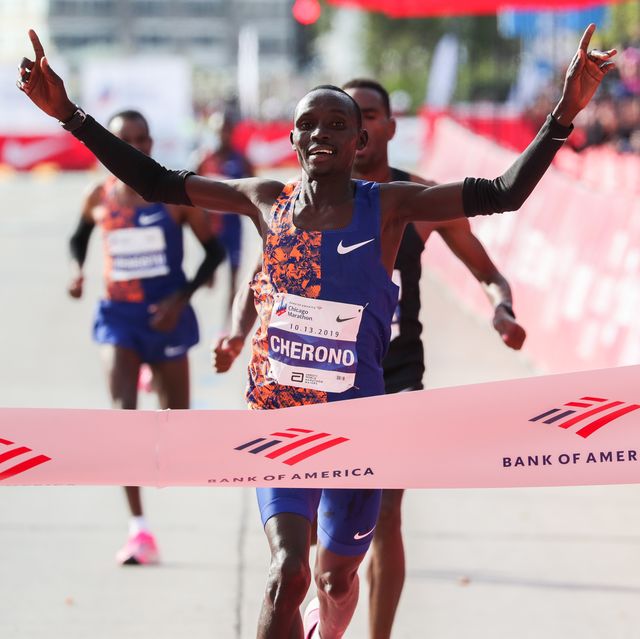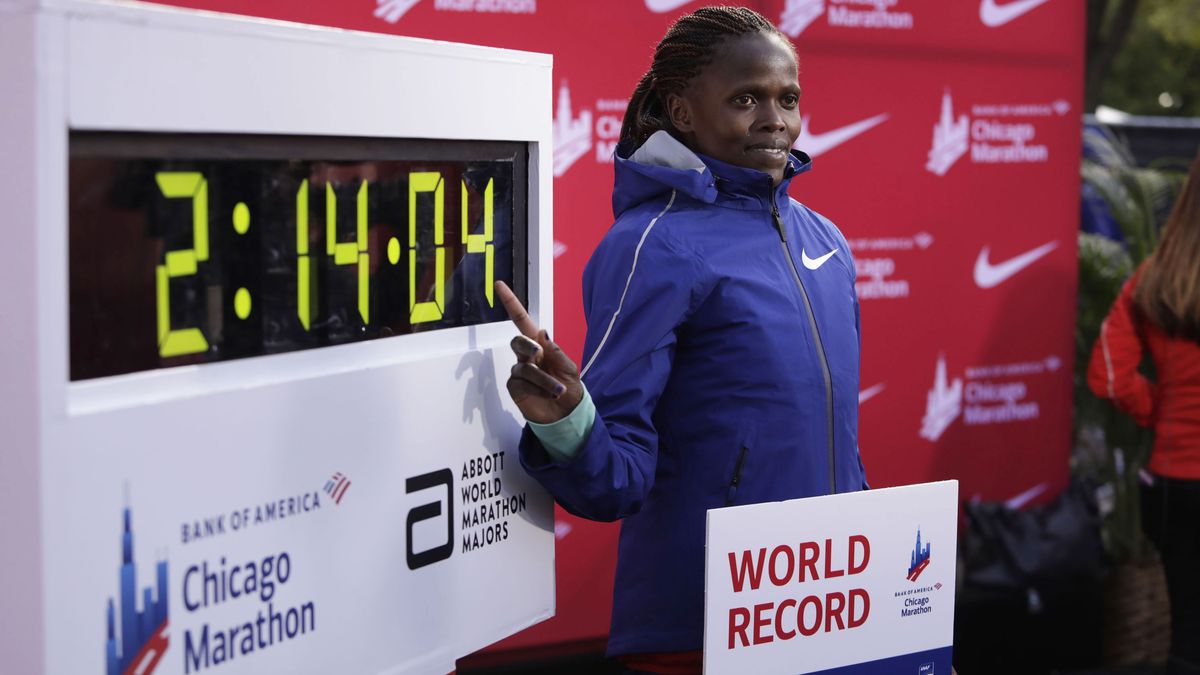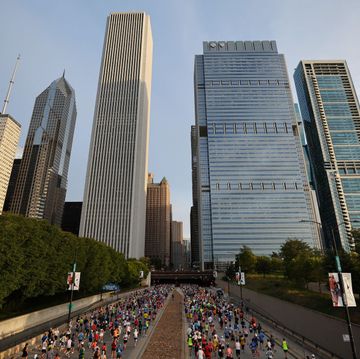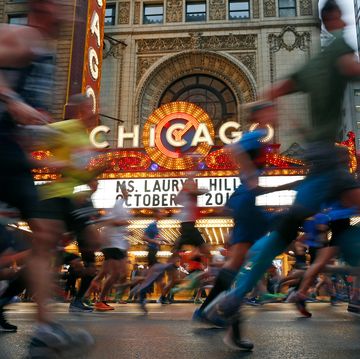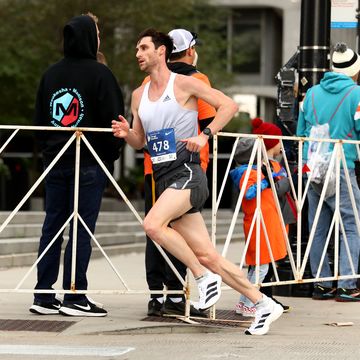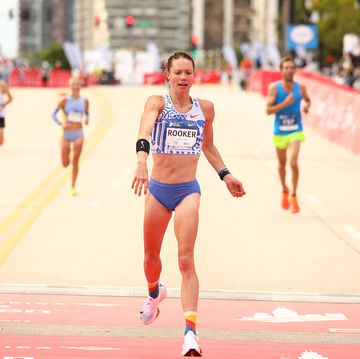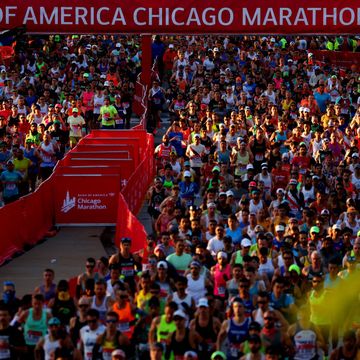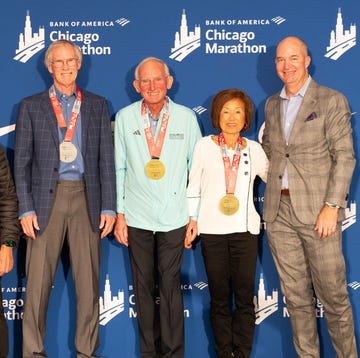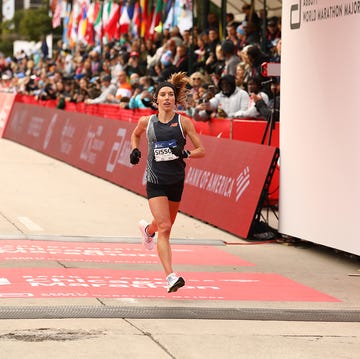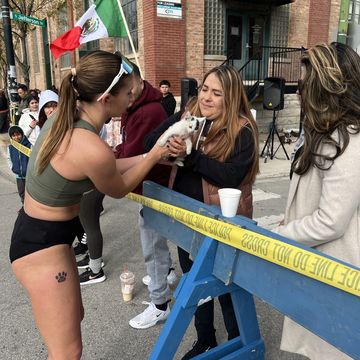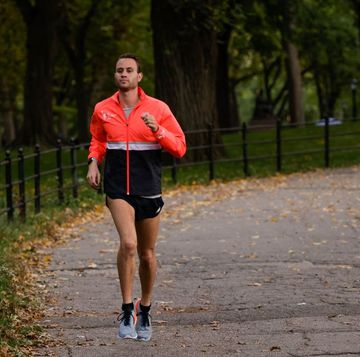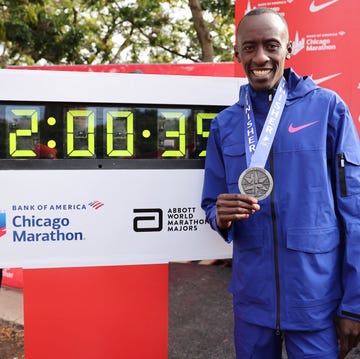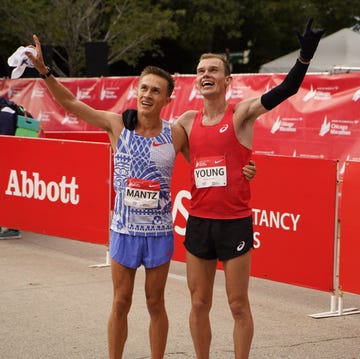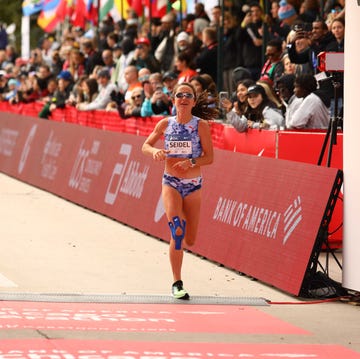- Lawrence Cherono of Kenya won the men’s race at the Chicago Marathon on October 13 with a time of 2:05:45.
- Cherono out-kicked Debela Dejene and Asefa Mengstu in the last 400 meters of the race. All three competitors finished within three seconds of each other.
- Galen Rupp pulled out just before mile 23, leaving Jacob Riley, Jerrell Mock, and Parker Stinson as the top three American finishers.
In an exciting sprint to the finish line, Lawrence Cherono claimed the 2019 Chicago Marathon crown. In a final time of 2:05:45, the Kenyan standout beat Ethiopian competitor Debela Dejene who finished one second behind.
Asefa Mengstu of Ethiopia trailed for the final podium spot in 2:05:48. Mo Farah, the 2018 Chicago Marathon champion, trailed over four minutes behind in a final time of 2:09:58.
The late surge between Cherono, Debela, and Mengstu was the closest podium finish in Chicago Marathon history.
“Winning a major race is a special thing to me because everybody cannot win a major race like this,” Cherono said after the race. “I was very motivated and I am happy for it.”
For Cherono, the performance was the second Abbott World Marathon Major victory in 2019. In April, he won the Boston Marathon in 2:07:57 in another kick to the finish. Cherono is the first man since 2006 to win Boston and Chicago in the same year.
Olympic bronze medalist Galen Rupp, who was competing in his first race since foot surgery, dropped out of the competition just before mile 23.
Watch: Cherono, Kosgei win the 2019 Chicago Marathon
Of the American competitors, Jacob Riley crossed the line first in a personal best of 2:10:36. The Boulder Track Club runner led an impressive group of performances from several American runners. Former Colorado State standout Jerrell Mock followed one second behind Riley in his marathon debut. Parker Stinson set a four-minute personal best by finishing 11th in 2:10:53. Bowerman Track Club standout Andrew Bumbalough also ran a personal best, with his time of 2:10:56, which earned him 12th place.
Matthew McDonald, Scott Smith, Brendan Gregg, Noah Droddy, Wilkerson Given, and Diego Estrada all ran under 2:12, while Brian Shrader, Alex Monroe, Colin Mickow, Dan Kremske, Willie Milam, and Alan Peterson all managed to run under the 2:15 barrier.
[From training tips, to fueling strategies, to improving the mind-body connection, the Runner's World 2020 Calendar will help you run your best all year long.]
With temperatures around 40 degrees at the start, the pacemakers for the men’s elite field shot to the front with Dickson Chumba in tow. For the first mile–which was run in 4:42–Chumba was the only competitor to join the two pacemakers in white singlets. The Kenyan standout, who won the 2018 Tokyo Marathon in 2:05:30, remained up front through the first mile as the chase pace gradually bridged the gap.
After the first mile, two elite groups began to form. The top pack, led by Chumba included Cherono, Debela, Bedan Karoki, Seifu Tura, and Asefa Mengstu. A few paces behind the front group, defending champion Farah led the chase pack with Rupp in tow.
By 5K, Chumba led through the first major split with a time of 14:45, which put the top group on pace to run 2:04:20 heading into the four mile mark. Behind the top group, Farah followed two seconds behind in 14:47 and Rupp chased two seconds behind his former training partner and four seconds behind Chumba.
By the five-mile mark, which was run in 23:39, the top nine runners had come together and formed one fairly strung out pack.
While podium favorites Farah and Cherono remained with the top group at 10K, Rupp began to fall off the pace. Just after that mark, Rupp–who has a personal best of 2:06:07 from the 2018 Prague Marathon–backed off the tempo set by the top group and began to attack the race by himself. At 10K, the closest competitor behind Rupp was Stinson.
Just after the 8-mile mark which was run in 37:48, Farah also fell off the pace set by the top group. At this point in his career, Farah’s fastest marathon is 2:05:11 from his victory at the 2018 Chicago Marathon. In a span of two miles, Farah was 11 seconds behind the top group.
At 15K, the Kenyan and Ethiopian contingent of Karoki, Chumba, Cherono, Debela, Mengstu, and Tura were running between 44:10 and 44:12. Eight or nine minutes before the halfway point in the race, Farah and Rupp formed a chase pack behind the leaders.
At 20K, Chumba led the top group in 59:01 with Cherono, Karoki, Debela, Tura, and Mengstu in tow. Farah, Bashir Abdi, and Rupp continued to chase with a split of 59:32.
At halfway, Chumba led the top group in 1:02:14, while Farah split 1:02:54 and Rupp followed three seconds behind.
Just after halfway, Rupp faded from the pace that Farah was maintaining. In the following mile, Abdi pulled ahead of Farah slightly and appeared to encourage him through the portion of the race that proved challenging.
At 25K, Karoki charged at the front of the top group of six runners in 1:13:54. At this point in the race, Abdi continued to work with Farah, while Rupp was eight seconds behind.
By the 18-mile mark, Rupp had regained his position with Farah. Together, the competitors crossed the split in 1:27:18.
At 30K, Chumba ran through the split in 1:28:58, still with his Ethiopian and Kenyan competitors in tow. At this point, Abdi had pulled away from Farah and Rupp by eight seconds. Farah passed the marker in 1:30:30 and Rupp followed five seconds back.
Just after 30K, the top pack dwindled down to five men. Chumba, who led the top group for a large portion of the race early on, faded away from the leaders by about 20 meters.
Debela pushed forward as the leader of the top group at the 35K mark. The Ethiopian standout brought the five competitors through 35K in 1:43:53. At the same split, Chumba trailed in 1:44:27, Abdi crossed in 1:45:15, Farah came through in 1:46:23, and Rupp trailed behind him by 22 seconds.
Just before mile 23, Rupp dropped out of the race and received medical attention on the course.
Cherono attempted to run from the lead group around 38K, but was unable to break away his competitors at that point. At 40K, the race for the crown was up to Debela, Mengstu, Karoki, and Cherono.
It wasn’t until Cherono’s final surge with 400 meters remaining that he secured his position as the champion.
“I just applied the effort and it worked and that is why I am the winner,” Cherono said.
Taylor Dutch is a writer and editor living in Austin, Texas, and a former NCAA track athlete who specializes in fitness, wellness, and endurance sports coverage. Her work has appeared in Runner’s World, SELF, Bicycling, Outside, and Podium Runner.
